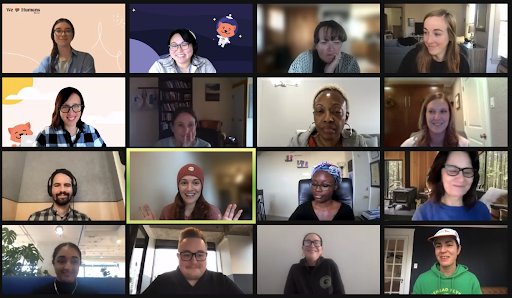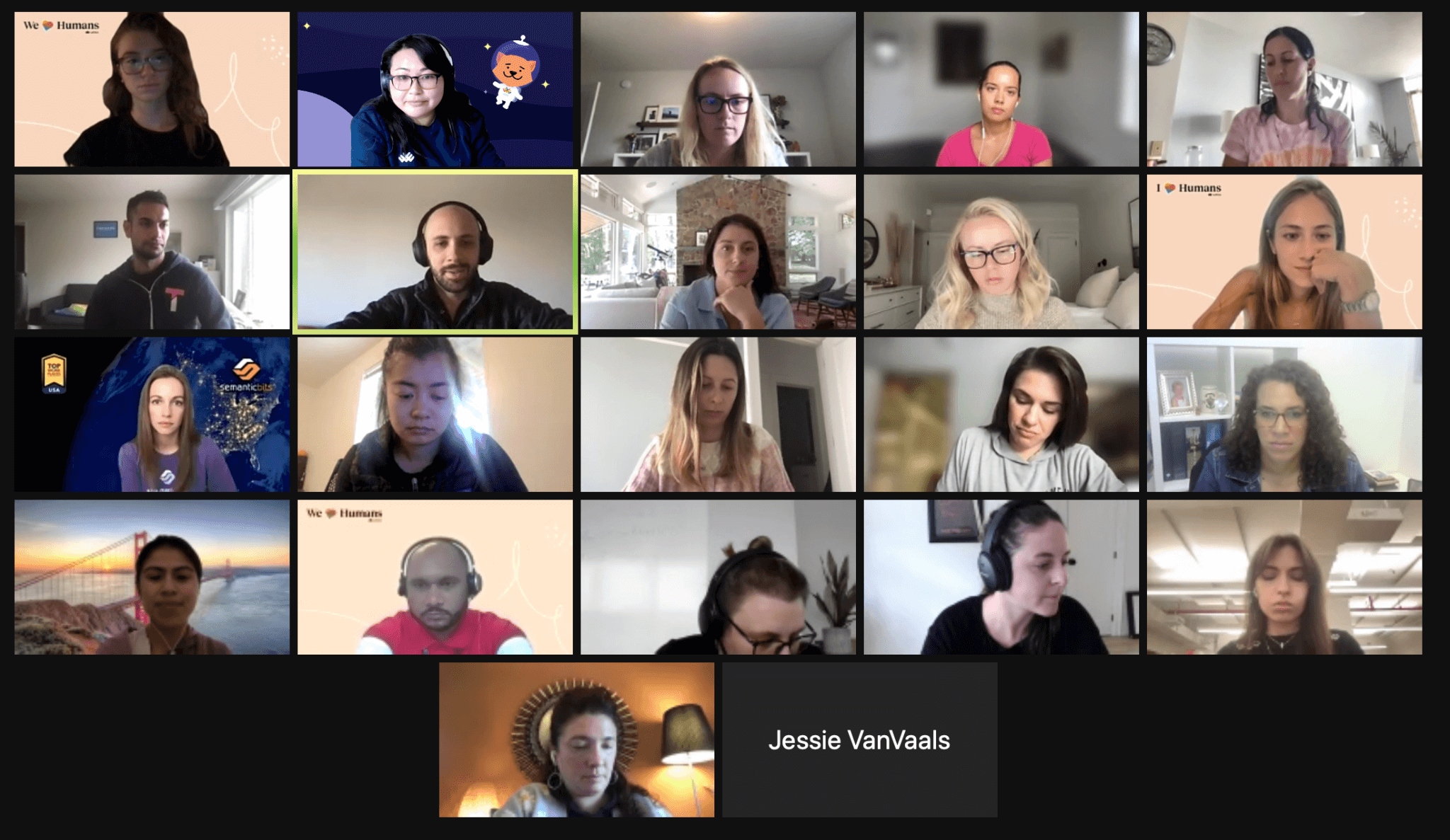The new year is the perfect time to set goals for the year ahead. For HR teams, the last two years have been filled with lessons learned from the challenges of a global pandemic, from hybrid work strategies to employee engagement, and more.
At the end of last year, Resources for Humans (RfH) community members hosted a virtual working session to share what they started and stopped doing in 2021, and how those decisions would influence 2022 planning. Here are some of the session’s key takeaways:
1. Talk to your employees and advocate for their needs.
“I did not create this idea, but I firmly believe that HR is the product manager of the people,” says Adrienne Barnard, SVP, People Operations & Experience at Mainstay. “We truly are the ones that should be building the roadmap, doing the user interviews, building the tools, designing the systems and processes that help engage people and retain them.”
As companies cope with waves of recent resignations, talking to your employees is more important than ever. Most, if not all, HR teams are including employee feedback in their long awaited reopening plans. Members also acknowledged that while surveys are a great way to get data from many people in one place, HR teams will always get a fuller picture by going to people directly.
“It can be hard in larger organizations,” says Barnard, “But you just get so much rich data when you just talk directly to employees, and it usually helps to add clear anecdotal evidence around what you're seeing in pulse surveys, as well.”
By combining employee engagement surveys with real conversations, there is so much HR teams can learn about what employees want (and what will make them stay). In today’s job market, top performers are attracted to the whole package –– not just compensation. RfH members emphasized building a strong culture to retain their employees, and that a lack of culture might really stem from a lack of care.
“I would just like to see our company focus more on their employees, because it's not all about raises and money,” says one member, “...sometimes when you get super big, it's all black and white, and that's it. Everything is in the handbook. Yes, but life doesn't fit in the handbook.”
And for employees who live by themselves, working remotely can be lonely. Sometimes just checking in on employees can be a welcome relief to them and shows that you care. “I was recently working with an employee [and] he said, ‘It’s nice to have an actual person I can talk to like, this is a big difference for me.’ I think having that friendly face in HR and just someone to talk to one on one helps people,” says Denise Mathews, People Operations at TRM Labs.
2. Give yourself some grace.
HR teams are tasked with a lot. It’s impossible to expect them to do everything…but sometimes, especially at startups, they are forced to wear many hats. Sometimes being a perfectionist can be a roadblock when you have too much to execute on — after all, “some things need to be perfect and some things just need to be done,” says Helen Kruskamp, Head of People at Vannevar Labs.
That’s where finding the right tools and tracking everything you’re doing becomes invaluable, said our RfH members. Take a look at all of the areas you’re expected to manage (talent acquisition, onboarding, etc.) and start automating what you can, but also look for tools that can integrate with your existing tech stack — your sanity and your team’s workflows will benefit from it!
“I recently got this software called Gather and it automates reminders mostly for me, but also for the team,” recommends Mathews, “So onboarding — whenever someone new starts, it reminds the manager of their tasks, it reminds their onboarding buddy, and it runs through Slack so people don’t have to learn a new tool.”
RfH members also recommended looking for the right tools to keep track of all the work that you’re doing –– because you are doing so much of it! Platforms like Lattice can help keep track of progress on goals, feedback from team members, and so on. But, for strapped teams, a simple Google Doc works just as well. Along with being great fodder for your performance review, seeing all the work you’ve accomplished is a breath of positivity when you’re feeling defeated.
“What if you're looking at your year-end review, and you don't even remember how much you accomplished. You can go back to [your doc] and go, "Oh my gosh, I did do a lot this year." says an RfH member, “[It] can remind yourself how much you really did impact even though at that moment, you may be feeling a little bit defeated because it's HR, and it's COVID.”
Most importantly, build in focus time and pauses in your day (and encourage employees to do the same). “I think focus time is a game changer,” says Ellie McLaughlin, Director of People Operations at Aprio Cloud, “I love it, and the other thing I always encourage my team to do is enable your ‘Snooze’ function on all your notifications — [just] pick a time.” Building that structure in when you can is like a reset button if you’re having an incredibly busy day.
“Plan a focus time — it has helped me so much,” says another member, “At the end of the day, sometimes I've been busy all day, but I haven't really accomplished anything. I really do need that hour of focus [to answer emails or return calls] or whatever it is I feel I need to do.”
3. Stop trying to do it all.
If 2021 could be summed up, Louise Storelli, Head of People and Culture at Local Projects, said it best: “Everything feels like a priority. And when I really look at it, they are. But then you have to look at those 20 other things and then boil it down to five.”
Along with finding tools to make work less complicated, RfH members all emphasized the importance of prioritizing your work and not simply reacting to things. “Strategy is a choice, you cannot choose to do everything,” says Carrie Matthews, Director of Talent at Accelevents, “And your employees will be upset with you if you choose to do everything. Being in a reactive environment, people will burn out, they do burn out, and then they leave.”
Being at the forefront of this new world of work, HR teams are constantly facing changes in benefits, employment laws, and fancy new tools. “I think it's very tempting to look at the industry, and look at different trends, and see, oh, that's cool. I want to do that,” says Matthews. “But you have to know what's right for you. You have to know what's authentic for your organization, and figure out how to make it work for you. If it doesn't apply to you, you can leave it behind.”
Instead of trying to do it all, as HR teams are prone to do, RfH members said they were committed to honing in on what matters most for each of them to spend their time on. “We're running a marathon, we're not sprinting, right? So it's about making sure that we're doing the most impactful pieces of work at the right times,” says Dustin Hutton-Alcorn, HR Manager at Sauce Labs.
As HR teams go into the new year, setting company, department, and individual goals is a tough but necessary practice to ensure everyone is on the same page and that the right things get prioritized. “You need to understand the business strategy first. What are the growth goals? What are the new market's potential goals? And then you can tie your People Strategy into that. ” advises Barnard, “I think it's really important that HR does have that seat at the table to help truly understand what that business strategy is in order to best set up that people strategy.”
4. Seek help externally.
On the flip side, our RfH members also emphasize the importance of not comparing yourself to others. Instead, they recommend doing the research and connecting with other HR professionals to find out what is working for others.
“One thing I've been trying to do since May is find groups where you can have these meaningful conversations with folks that are external so that I can get a better understanding of what other people are doing and best practices that are out there,” shared one member.
Lucky for you, the Resources for Humans community of over 14,000 HR practitioners is also a great resource for HR/People Ops professionals looking to connect with peers.
“I have found such information and support, both tactical and emotional, especially with the Slack community with Resources for Humans,” says Kruskamp. “This has been such a wonderful community for me to find.”
Another option HR professionals looked to? Mentoring and coaching are both powerful tools to equip HR people for growth and success. “Being able to tap into our own individual potential with the power of coaching can make a huge difference,” says Hutton-Alcorn, “I've been working with a leadership coach over the last six months, and it is such a powerful tool. So make sure that you're investing in yourself, as well, and getting yourself to where you want to be.”
Seeking a mentor yourself? Be sure to check out the RfH Mentorship Program.
–––
Those are just some of the insights shared during our final Resources for Humans virtual working session of 2021. If you haven’t already, join the over 14,000 HR leaders that make up our Slack community as we go full steam ahead into 2022.





.jpg)

